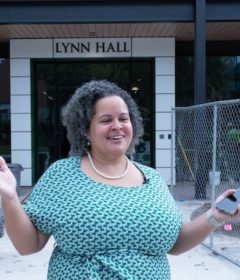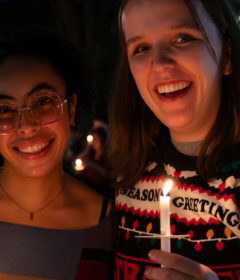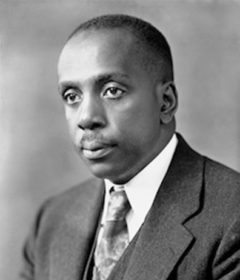Stetson Votes Week: Campus Engagement, Entertainment and Education
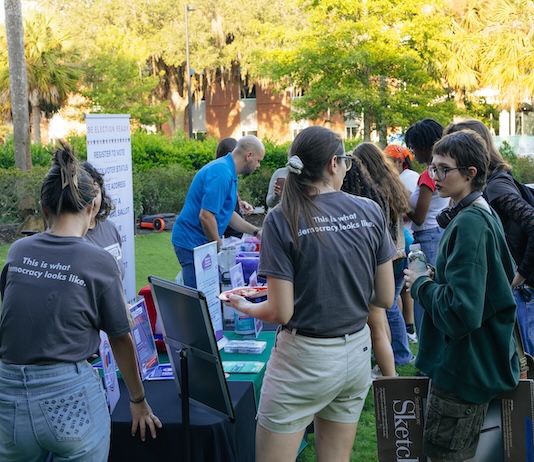
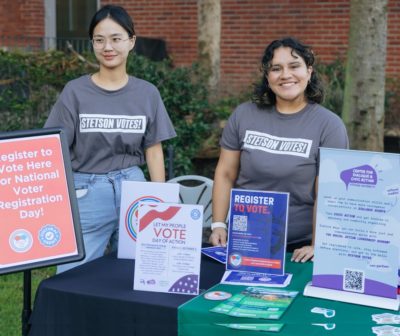
Speaking on Constitution Day, Wednesday, Sept. 17, Desmond Meade, executive director of the Florida Rights Restoration Coalition, shared his inspiring journey from a homeless convicted felon to graduating from law school and leading the fight for Florida’s Amendment 4 in 2018. The amendment restored voting rights to 1.4 million people with past felony convictions.
Two days later, Steven David, PhD, professor of international relations at Johns Hopkins University, focused on global geopolitical changes and U.S. security concerns, with particular emphasis on Asia and the Middle East.
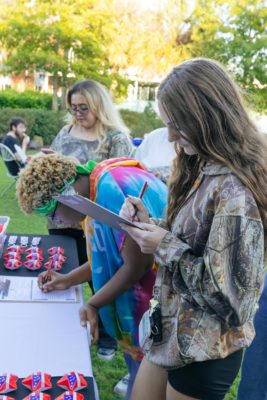
Those two events were among the highlights of Stetson Votes Week, Sept. 15-19 — days filled with vibrant nonpartisan voter engagement on campus, a rock concert, national speakers, trivia contests and giveaways. The ambitious week was organized by the student-run Stetson Votes organization.
“Stetson Votes Week showed the very best of our campus community,” commented Rev. Caitlin White Swann, associate director for Dialogue & Civic Action, who serves as the Stetson Votes adviser. “Students from across the political spectrum dedicated their time to the nonpartisan work of making sure their peers are registered to vote — regardless of who they support at the ballot box.”
On Tuesday, Sept. 16 — National Voter Registration Day — the band 407 Groove performed near Libby Lawn during the Rock for Democracy Concert, which also featured food and a Stetson Votes team helping students register to vote. Several members of the band are Stetson music students.
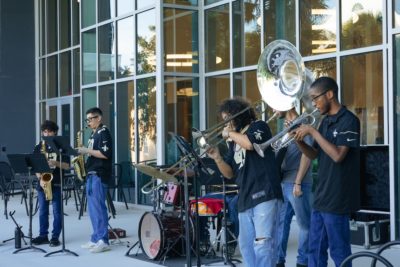
While the concert scene was energetic, Meade’s speech the next day was impassioned. His appearance was part of Stetson’s Free Inquiry & Expression and the Future of Democracy Series, established last spring to enable open dialogue about a wide variety of timely topics through national speakers, panel discussions and civil discourse.
Amendment 4 was approved by nearly 65% of voters. Yet, the celebration didn’t last long, Meade stated. In 2019, the Florida Legislature passed a state law prohibiting the restoration of voting rights until the people paid all fines and court fees associated with their conviction. This financial burden placed another obstacle before them, he said.
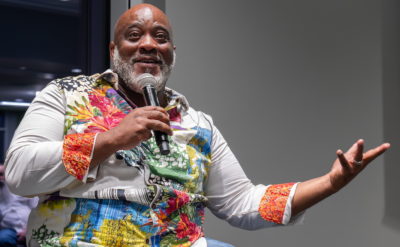
“What we didn’t get quite right was understanding the power of the political forces that can act as dividers of the people,” Meade told the crowd of 75 people in the Lynn Presentation Room at the Rinker Welcome Center. “We were not prepared for the ferocity of this hyper-partisanship that this world has and that we see even today.”
In response, Meade’s group began raising funds and eventually received millions of dollars, including donations from celebrities like Michael Jordan and Michael Bloomberg — to help people pay their fines and have their voting rights restored.
“At the end of the day, we believe a more inclusive democracy is a more vibrant democracy,” he said. “The more people participate in our system, the better it is for everyone.
“We were fighting just as hard for that person who wishes they could have voted for President Barack Obama as for that person who wanted to vote for Donald Trump. And I understood that if you are really true champions of democracy, your priority is not how a person votes. It’s that they vote.”
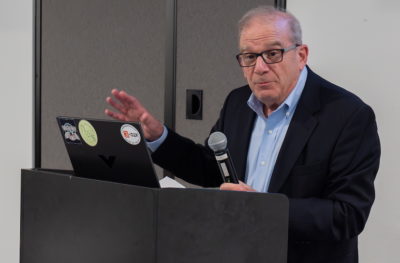
On Friday, Sept. 19, in Lee’s Garage at the Carlton Union Building, David’s presentation also was part of the free inquiry and expression series, and sponsored by Stetson’s Alexander Hamilton Society student organization. David’s expertise centers on security studies, American foreign policy, Sino-American relations and turmoil in the Middle East. Currently, he is working on three projects. The first examines why China’s leadership will or will not go to war over issues such as Taiwan. The second project considers the emerging Sino-American competition in the developing world, as he cites that this competition will play a greater role in determining global peace and stability than will a focus on great power conflict. His third project looks at existential threats to Israel.
David’s talk, presented in front of approximately 75 student, faculty, staff and community members, touched on all of those issues. Among his comments was a call to action for the United States.
“The major reason why America is not prepared to deal with China is that we are such a divided country,” he said. “You cannot mount a common front against an adversary when you’re fighting amongst yourselves with the intensity and extent to what happens here. So, unless we get our act together in this country — and it doesn’t mean we all have to agree; we all have to at least agree to disagree on reasonably friendly terms — it’s hard for me to see us mounting the kind of resistance to China that we need to have.”
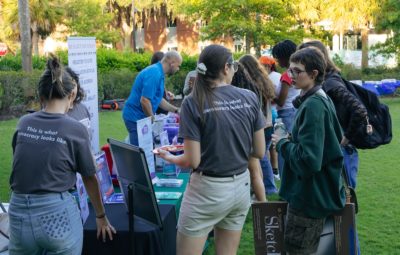
Consistent with the entire week of events, the messages heard did what they were intended to do: spark further healthy conversation on campus.
“These events,” concluded Swann, “created space for meaningful conversations about what unites us: our shared citizenship, our responsibility to exercise our rights and our role as global neighbors.”
-Michael Candelaria and Cory Lancaster

